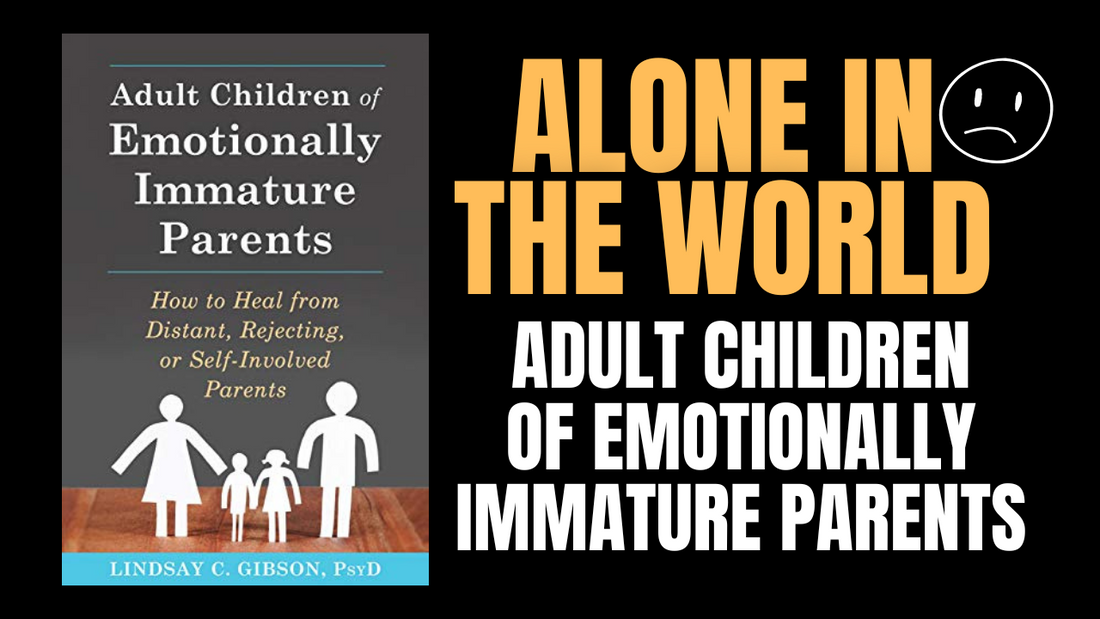This was one of the topics discussed in our recent livestream of Lindsay C. Gibson's classic self-help book Adult Children Of Emotionally Immature Parents. You can watch the full stream at the bottom of this article, or continue reading for some the core insights we uncovered.
The Hidden Pain of Emotional Neglect
Most importantly, a lack of emotional connection doesn't require overt neglect or abuse, making it difficult for outsiders - and even ourselves - to recognize. In many cases, it's the subtle absence of emotional engagement that leaves the deepest scars. We may have had our basic physical needs met, but emotionally, we were often left to fend for ourselves.
The Lingering Effects of Emotional Isolation
Unfortunately, the repercussions of this type of disconnected emotional upbringing extend far into adulthood. The core feeling of emotional loneliness doesn't usually fade away independently; it follows us, influencing how we form relationships and perceive our own worth. Often, we find ourselves replicating the familiar patterns of our childhood in our adult relationships, seeking out partners who reflect the emotional unavailability of our parents.
In our book club discussions, for example, many have shared stories of finding themselves in romantic relationships with people just like their emotionally distant parents. These relationships, often entered into despite our better judgment, are a testament to the profound impact emotional neglect has on a child's development and the adult they become.
The core emptiness remains even if they have a superficially normal adult life. Their loneliness can continue into adulthood if they unwittingly choose relationships that can't give them enough emotional connection. - Lindsay Gibson
Breaking the Cycle Through Self-Awareness
As outlined in Adult Children Of Emotionally Immature Parents - as well as books like Eckhart Tolle's The Power Of Now, The Four Agreements by Don Miguel Ruiz and Michael Singer's The Untethered Soul, the path to healing begins with awareness. Recognizing the source of our emotional loneliness is the first step toward recovery. It involves understanding that the absence of emotional intimacy in our upbringing is not a reflection of our worth but a consequence of our parents' limitations.
Awareness is always the first step. Without awareness, there is nothing you can change. - Don Miguel Ruiz
The Answer To Feeling Alone In The World
For adult children of emotionally immature parents who continue to struggle with emotional loneliness, the answer lies in fostering emotional awareness and deliberately engaging in self-reflection to better understand our emotional landscapes.
By listening to our emotions rather than suppressing them, we start to understand the roots of our feelings. By engaging with this process we are able to address the core issues of emotional disconnect that was implanted as a result of our upbringing. The goal is to recognize that our feelings of emptiness and disconnections are not quirks of our personalities but responses to real deficits in our early emotional interactions.
We don't need our parents to be different, we don't need our parents to tell us they're proud of us or they love us or to hug us in the way that they've never done before. We can do all that for ourselves; we just have to develop the tools.
Once we've identified and validated our emotional voids, we must take on the responsibility of actively seeking and cultivating relationships that offer true emotional intimacy. This involves choosing partners, friends and healing communities like the Academy of Self Help who not only make themselves emotionally available but are also willing to engage in meaningful exchanges that validate our feelings and experiences.
To continue exploring the impact of a childhood spent with emotionally immature parents, visit the Adult Children Of Emotionally Immature Parents Intensive, a comprehensive course built in collaboration with psychologist Lindsay C. Gibson that will help you navigate the healing process.
Watch The Full Video
Topic Timestamps
Introduction and Definition of Emotional Loneliness (0:00-1:30)
Introduction to the topic and an exploration of emotional loneliness, how it starts in childhood with emotionally immature parents, and how it manifests in adult relationships.
Emotional Neglect vs. Physical Presence (1:30-3:06)
Discussion on how physical presence of parents doesn't equate emotional connection, introducing the concept of 'Big T' and 'little t' traumas.
Long-term Effects of Emotional Isolation (3:06-4:25)
Overview of how childhood emotional isolation impacts adult life, leading to emotional disconnection in relationships and social interactions.
Self-Awareness and Recognizing Emotional Needs (4:25-5:47)
Focus on the importance of self-awareness in recognizing one's emotional needs and the detrimental effects of having emotionally immature parents.
Emotional Intimacy and Security from Parents (5:47-7:10)
Examination of the roles emotionally engaged and mature parents play in the emotional development and security of a child.
Contrast Between Emotionally Mature and Immature Parents (7:10-8:25)
Contrasts emotionally mature parents, who provide emotional security and connection, with emotionally immature parents, who fail to notice their children’s emotional states.
Introduction to Book Club Discussions and Emotional Loneliness (8:25-10:06)
Introduction to book club discussions on the topic and further exploration into emotional loneliness and its roots in childhood experiences.
Impact of Parental Emotional Neglect on Adult Relationships (10:06-15:09)
Deep dive into how emotional neglect during childhood leads to challenges in forming healthy adult relationships and the tendency to repeat patterns.
Strategies for Understanding and Healing Emotional Neglect (15:09-18:01)
Discussion on strategies for understanding and healing from emotional neglect, emphasizing the importance of acknowledging and addressing one's emotional past.
Patterns of Denial and Repetition in Adult Relationships (18:01-21:05)
Analysis of how denial of childhood emotional neglect leads to repetitive patterns in adult relationships and the difficulty in recognizing harmful patterns.
Overcoming Emotional Isolation and Building Healthier Relationships (21:05-27:05)
Focus on overcoming emotional isolation by recognizing and validating one's feelings and building healthier, more emotionally fulfilling relationships.
Reflection and Concluding Thoughts on Emotional Growth and Healing (27:05-End)
Reflections on emotional growth and healing, summarizing the discussions and emphasizing the importance of self-awareness in overcoming the legacy of emotionally immature parents.

